Topower PowerBird 900W
Aug 25th, 2008 | By Anthony
Topower PowerBird 900W
Date
: 08/26/08 – 12:43:30 AM
Author
:
Category
: Power Supplies
Page 1 : Introduction
In some way or another, all of us probably are in some way or another familiar with Topower. As one of the oldest players in the power supply market, Topower has a lot to bring to the table. Opening its doors in 1986, Topower has expanded its reach world wide, including numerous branches across the United States. Though immediately, Topower may not be the most recognizable name on the market, they have had a profound influence on the development of high-end performance power supplies including airflow, power supply connector design and the modular connection.

Topower has always stood by, like a loyal friend, or an angst-filled teen in the corner, take your pick. But unwittingly, while trembling fingers handled Topower built power supplies from more recognizable companies like OCZ, Tagan, or BFG, just to name a few, Topower has stood by. Topower is not entirely unknown though; every once and a while, receiving an appreciative nod of approval, Topower graces the stage.

One can only assume, being a side act gets old quickly. Today we will be looking at a unit for Topower and by Topower, the PowerBird series. Featuring fully modularized cables, super efficient design, six 12V rails powered by two 12V transformers, and available in both 900W and 1100W configurations, it is safe to say that we have quite the power supply in our hands.
Page 2 : Features and Specifications
Here is what Topower has to say about the PowerBird series:
‘PowerBird power supply is truly a build of craftsmanship that is intended to meet today's most demanding gaming machine and expectations of system builders’, said Rick Lee, Product Manager for the Topower Computer USA. ‘The PowerBird power supply has been adopted by many high-performance system integrators in North America. We work closely with these professionals ensuring the power supply we build are in solid quality and deliver greatest value to consumer.’
The PowerBird will be available in 900W and 1100W configurations, delivering up to 1.1KW of continuous power through a complete array of connectors including six 6pin and (6+2)pin PCI-E and two 8pin processor connectors. These PSUs are kept extremely cool and silent with a large 120mm fan and feature a standard ATX power supply form factor.
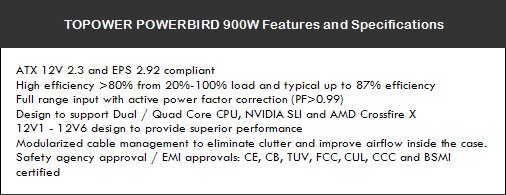
A fairly typical list of specifications, and we of course would expect no less.

One of my very first questions I had for Topower was: why
fully modular
. Regardless of the system, the ATX connector will be in use, so from a practicality stand point, it makes little sense to make the ATX connector removable. Contacting Topower, here was their response.
‘The idea of fully modularized cable is for users and system builders to save time on cable routing and save money on shipping as well.
For example, if the power supply goes bad, just the PSU itself need to be removed from the box and all cables stay in original places. When getting back power supply, just re-connector cables to power supply without extra cable routing needed.
The idea is especially popular among gaming system builders like Voodoopc, Alienware, Falcon NW, and Velocity Micro.
And of course, fully modularized PowerBird has solid QC control and passed HP lab tests such as shock & vibration, stress, acoustic test, and EMI test. We are not making it fully modularized because of high return rate!’
What it comes down to is: it neither hinders or adds to the power supply, although it grants the claim ‘fully modular.’

With six rails, things do get confusing. Thankfully, the modular output on the power supply is labeled. This will especially come in handy with high end systems in order to prevent overloading any individual rail.
Page 3 : Package and Contents
The PowerBird series comes in a fairly typical cardboard box, nothing too flashy, but it gets the job done.
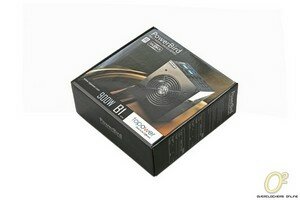
On the back, we have more in-depth features, more or less what we found on the website.
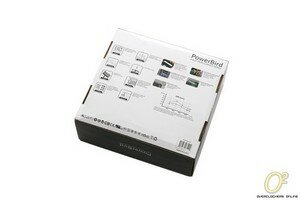
Towards the side, output and cable lengths are listed.

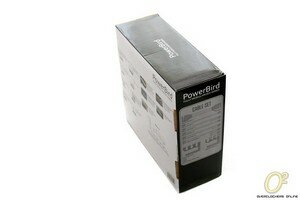
Removing the unit from the package, Topower has included along with the power supply, cables, screws, a manual and a power cord.
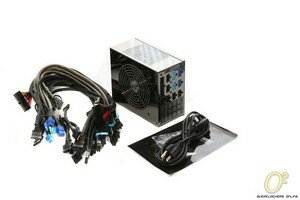
The PowerBird 900W is finished in a classic dark chrome, a titanium like finish with matching accents in silver, black and shades of blue. It is quite possible that this color scheme is borderline generic, and all around typical, however, a winning combination none the less.
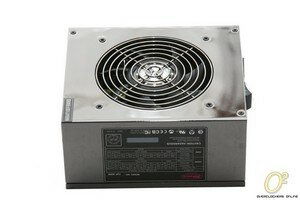
The large 120mm fan on the bottom of the unit should do an excellent job acting as an exhaust for the computer system, and cooling the power supply by drawing air from the case into the power supply and then through the perforated black end.
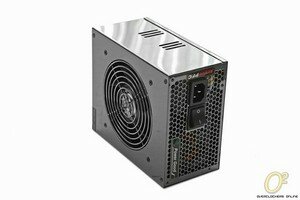
Towards the front, we have the modular connectors, and as mentioned earlier, are labeled including corresponding 12V rails.
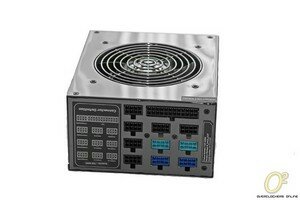
By anyone's count, 900W is a lot of power, and you better believe Topower intends for it to all be put to use!
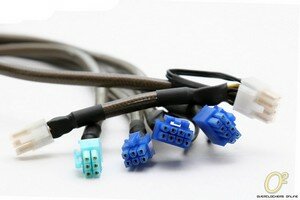
This unit boasts a total of six PCI Express connectors, two 8 pin connectors, three 6+2 pin connectors, and one standard 6 pin connector.
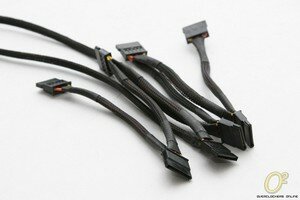
We also have a total of eight SATA connectors, two total cables with four connectors on each.
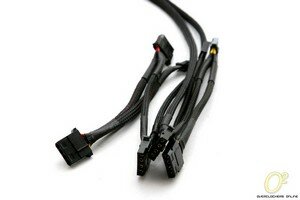
For those who make use of bay LCD panels, fan controllers or accessories, or are unfortunate enough to be using a floppy drive, Topower has included two floppy drive connectors at the end of the 4 pin molex cables.
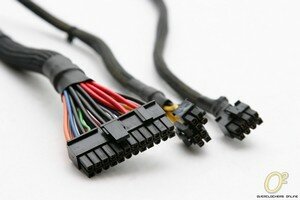
For the motherboard, we have a 20+4 pin motherboard ATX connector, and 8 pin connector, and a 4+4 pin connector.
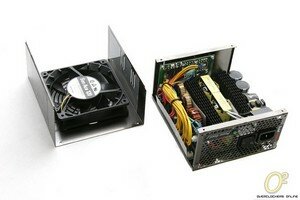
Opening the unit up, what's that we see? A Sanyo Denki fan!
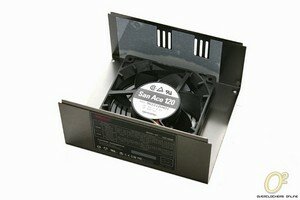
Peering deeper into the unit, things are beginning to look pretty familiar, all around, it screams Topower built.
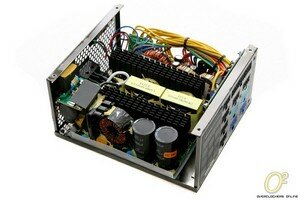
Right in the center, we have two sizable transformers for the 12V rails.
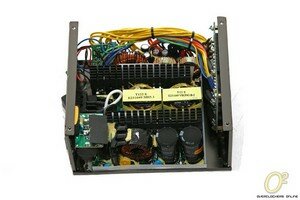
Inside, we have a fair assortment of Teapo capacitors.
Page 4 : Testing Setup
Quite unlike any other PC component, properly evaluating a power supply involves much, much more than running a battery of tests or sitting down in front of a shooter for a few hours armed with a pen and a pad of paper. Although, we have the utmost appreciation for a few headshots coupled with explosions, power supply reviews call for much more. The general mantra for testing power supplies tends to fall somewhere in the ranges of loading the power supply up to the top, and letting it suffer. We here at Overclockers Online are inclined to agree. Accordingly, our testing methods have evolved to allow for more sophisticated and accurate testing.

The dilemma here is: how to test a power supply without a computer system, but emulate a computer system? It is important to not forget that as much as we try to part from throwing a power supply into a computer system and watching how it performs, ultimately, what we are distancing ourselves from is precisely what we are trying to replicate. Simply, the ideal testing platform would indistinguishable from a computer system, but graced with the accuracies of an adjustable load. However, since do not have access to state of the art testing equipment, or the funds to purchase such equipment, we have built a custom load tester. While it does not offer adjustments in the thousandths of a decimal place, it does offer enough flexibility to test current day power supplies and beyond.

Using thick high quality 16AWG wires throughout and equally high quality connectors and switches, we have sought to minimize resistance in the lines while maintaining flexibility. All it takes is a flip of a switch to turn a desired resistor on or off.

A proper electronic load is a start, but we are going to be a bit more ambitious. A keystone piece of our testing mythology is the heat box. A system drawing 800W from a power supply produces quite a bit of heat, and to be testing such a power supply in an ambient environment is not only inconsistent with in-system applications but unrealistic and misleading. Our hotbox consists of nothing more than a case graciously donated to us from Silverstone. Recycling heat produced from the load tester using a series of controlled fans and a duct, we can control operational temperatures and push a power supply to its limits, or over.

Using the heat and load, we will run a battery of five tests; three cold and two hot tests. The three cold tests consist of 50% load, 80% load and finally full load. Naturally, we will escalate the strain on the unit by adding heat in the hot tests. The final two tests are 80% load and full load at approximately 50°C or more.

While the purpose and effects of 'burn in' are debated, doing so causes no harm. Prior to any testing, all units are run for a maximum period of one week without load. At best, this will stabilize the unit; at worst it takes a few hours off the unit's total life span.


In our tests, we will do our best to adhere to ATX specifications including cross loading and criteria for testing. The presentations of our results are designed for ease of interpretation and conciseness.

So, without any further delay, let us get started!
Page 5 : Testing
The aim of the cold test is to reflect ideal operational conditions where heat from the computer system is independent from the power supply. Still though, the term cold test would be misleading as things do get quite hot!



Our set of cold tests went by well, when we ramped up the load from 50% to 80%, we did see the 3.3V rail slip from the A bit, landing in the 3% to 5% interval. Still though, well within specs.
Next, is a personal favorite of mine, let's turn up the heat a bit.

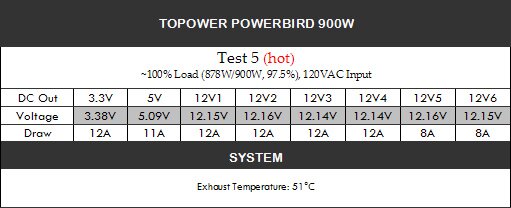
If anything, turning up the heat did this unit some good! Our temperature probes hit a high of 51°C in our last test, though only caused superficial brushes on the performance. Again, the rails remained rock solid. It is worthy to note, although things got toasty, the PowerBird 900W remained fairly silent.


The PowerBird series are fairly typically sized, however, the modular connections coupled with the stiffer plastic shielded PCI Express connectors do add a bit of overhead. However, if it fits in our small form factor testing case, it should have no trouble fitting into most cases.
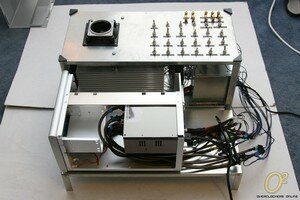
The only real problem I can foresee would either be with larger sized disk drives, or aesthetics and ease of routing cables.
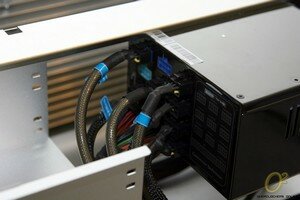
With the power supply in place, mount with the included screws and you are ready to go!
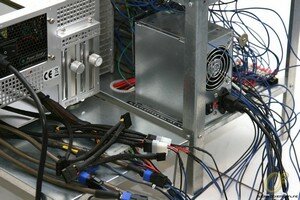
Page 6 : Conclusion
For Topower's first showing here at Overclockers Online, they have done a great job. The PowerBird series combines the best of performance, features, and of course, affordability. For the $200 dollar range, Topower has its audience sorted out. While the PowerBird isn't a value oriented power supply, for the price, it's a solid contender in the high end power supply market.
If not for our use of suggestively dramatic colors, 'green across the board' would apply. Regardless of the amount of load, or the environmental conditions, the PowerBird 900W walked away untouched.

More than performance and price however, the PowerBird comes with quite a few nice features to sweeten the package. Fully sleeved, and finished in a titanium-like chrome finish, this unit looks as good as it performs, not to mention, it is quiet as well. Overall, Topower has put together quite the power supply and we are looking forward to see what the future holds for Topower!

Advantages
- Excellent performance
- Fully sleeved
- Quiet
- Beautiful paintjob
Disadvantages
- Stiff PCI Express cables
Overclockers Online would like to thank Topower for providing a review sample of the PowerBird 900W. Overclockers Online would also like to thank SilverStone Technologies for providing the chassis for use in our load tester.
